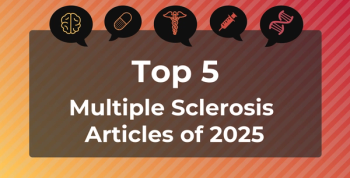
Selecting Treatment for MS: Shared Decision-Making
Amit Bar-Or, MD, FRCP, FAAN, FANA: Treatment decisions are complex in multiple sclerosis [MS], more so than ever, with all the options that are now available. Treatment initiation is often a discussion that can differ in style and approach, depending very much on the person who has MS. There are 2 general approaches, one of which is to start with a gentle treatment that may be sufficient to control that individual’s MS and then escalate gradually if one needs a stronger treatment. The upside of that is a person may end up on the gentlest treatment that is sufficient to control their MS. The downside is that by the time you may end up reaching a stronger treatment, a certain loss of tissue in the central nervous system will have happened and we don’t know how to reverse that.
The other approach is to use a medicine that is quite strong up front. This is something we were reluctant to do when those stronger therapies had substantial risks associated. Now that some of the approved therapies are both highly effective and generally quite safe, at least in terms of a few years of exposure, we are, as a community, moving further and further towards a more intense treatment early on, a decision that of course involves the patient and those close to the patient. And people, it turns out, have very different views of what is the right thing for them, including very different degrees of risk aversion that ultimately are very important to include in the discussion and in the decision.
Nowadays, people living with MS have access to a great deal of information and often come in even around the time of the initial diagnosis with a view on which medicine they would like. Their preference has a very important role to play. It’s very important for them to be on a treatment that they’re comfortable with, that they’ve subscribed to in a sense, and that they think is the right one for them.
Sometimes there’s an important role for education above and beyond what they’ve come with and helping them obtain high quality information. The importance of engaging in a dialogue around treatments can’t be overemphasized. There are people who will be disinclined to take a medicine that is sufficiently strong for MS, and there’s role for education about what happens if tissue is already damaged. And to date, we don’t know how to reverse that type of damage. There are people who sometimes may opt for a treatment that is more aggressive than the clinician thinks is necessary. At the end of the day, and my personal view is that the dialogue is critical and that understanding what motivates a person to opt for one treatment or another is an important insight to have as part of that discussion.
Barry Hendin, MD: When I make a decision about initiating therapy for someone with MS, I’m very aware that it’s a dialogue and that it involves the person who I’m talking to, their wishes, and their thoughts and my own. I have over the course of time generally progressed to the earlier use of more effective therapies. I discuss that philosophy with patients, and mostly they agree. But, you’ve got to be able to include the patient’s wishes as well as your own. To the extent that their wishes are different, unless their wish is a dangerous one, I think most of us try to at least collaborate on their terms.
There are isolated instances. I think I said earlier that people with MS are all snowflakes. You can’t use a one-size-fits-all approach. There is no one therapy that is the exact right therapy for everybody. Some of the considerations in terms of what I want to use depend on a person’s age, how severely impacted they are, the anatomy of their MS—whether it was a spinal cord lesion, a brain stem lesion, or a cerebral lesion—and how quickly they recovered. Even things that we wouldn’t think would come into consideration do. What’s their gender, what’s their age, what’s their race? And so there are many variables that will point me toward my suggestion. But in the end, it’s a dual decision, not a unilateral one.
Once upon a time, there was only one route of administration, and that was injectables. I think the use of oral agents and infusions has increased over time and that the early use of oral agents—though infusible agents have not been replaced—has become more likely. Patients prefer it. I think that clinicians who are experienced with a wide range of therapies also generally prefer it.
Amit Bar-Or, MD, FRCP, FAAN, FANA: Compliance and adherence are important issues and ones that are valuable to identify and discuss early on. Much of it has to do with expectations. There are people who are more or less tolerant of different types of therapies and their adverse events. There are those who want to be more aggressive based on how important it is for them to not experience any further worsening of their neurological status. The engagement of individual people living with MS with their treatment decision is an important step towards optimizing adherence and compliance. There are medications that are harder to monitor for because it’s not clear if a person is or isn’t taking them. And sometimes when you’re concerned that a person is not in a position to reliably take the medicine, but it’s the correct medicine that the team has agreed with the patient to use, there are treatments that are easy and administered in an office, for example. And then one certainly knows that the treatment has been given, such as with intravenously infused treatments.
Newsletter
Stay ahead of policy, cost, and value—subscribe to AJMC for expert insights at the intersection of clinical care and health economics.









